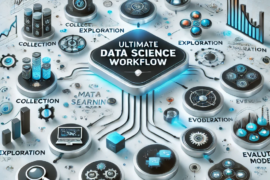In the realm of data science, tools and technologies are indispensable. They enable data scientists to extract insights, build predictive models, and solve complex problems efficiently. This article explores the critical tools and technologies that define data science and their applications.
1. Data Manipulation and Analysis Tools
Data manipulation is the cornerstone of data science, and robust tools make this process seamless:
– Programming Languages: Python, R, Julia.
– Data Libraries: Pandas, NumPy, Dplyr (for R).
– Big Data Platforms: Apache Spark, Dask, Databricks.
These tools empower data scientists to clean, preprocess, and analyze data efficiently.
2. Visualization Tools
Data visualization transforms raw data into meaningful stories. Essential tools include:
– Libraries for Python: Matplotlib, Seaborn, Plotly, Altair.
– Dedicated Visualization Platforms: Tableau, Power BI, Google Data Studio.
– Custom Dashboards: Dash, Streamlit.
Visualization tools help communicate insights effectively to stakeholders.
3. Machine Learning and AI Frameworks
Machine learning frameworks simplify the development and deployment of predictive models:
– Deep Learning Frameworks: TensorFlow, PyTorch, Keras.
– Traditional ML Libraries: Scikit-learn, XGBoost, LightGBM, CatBoost.
– Specialized Frameworks: OpenCV (for computer vision), NLTK and spaCy (for natural language processing).
These frameworks enable efficient training and tuning of machine learning models.
4. Cloud Platforms for Data Science
Cloud computing provides scalable and cost-effective solutions for data storage and analysis:
– Popular Platforms: Amazon Web Services (AWS), Google Cloud Platform (GCP), Microsoft Azure.
– Specialized Services: AWS SageMaker, Google AI Platform, Azure Machine Learning.
– Collaborative Environments: Google Colab, Azure Notebooks, JupyterHub.
Cloud platforms streamline workflows by offering compute power and collaborative tools.
5. Big Data Tools
Handling large datasets requires specialized tools and platforms:
– Data Storage: HDFS, Amazon S3.
– Data Processing: Apache Hadoop, Apache Spark.
– Data Integration: Apache Kafka, Talend, Informatica.
Big data tools make it possible to process and analyze massive datasets efficiently.
6. Collaboration and Version Control
Collaboration and reproducibility are essential in data science projects:
– Version Control Systems: Git, GitHub, GitLab.
– Project Management: Jira, Trello, Asana.
– Code Notebooks: Jupyter Notebook, JupyterLab, R Markdown.
These tools ensure smooth teamwork and version tracking across projects.
7. Automation and MLOps
Automating workflows and operationalizing models are key to scalable data science:
– MLOps Platforms: MLflow, Kubeflow, DVC.
– Workflow Automation Tools: Apache Airflow, Luigi, Prefect.
– Containerization: Docker, Kubernetes.
Automation tools help maintain and monitor machine learning systems in production.
Conclusion
Tools and technologies are the driving force behind modern data science. Staying updated with these tools not only enhances productivity but also ensures competitiveness in the field. Whether you are cleaning data, building models, or deploying systems, the right tools make all the difference.




Comments are closed.